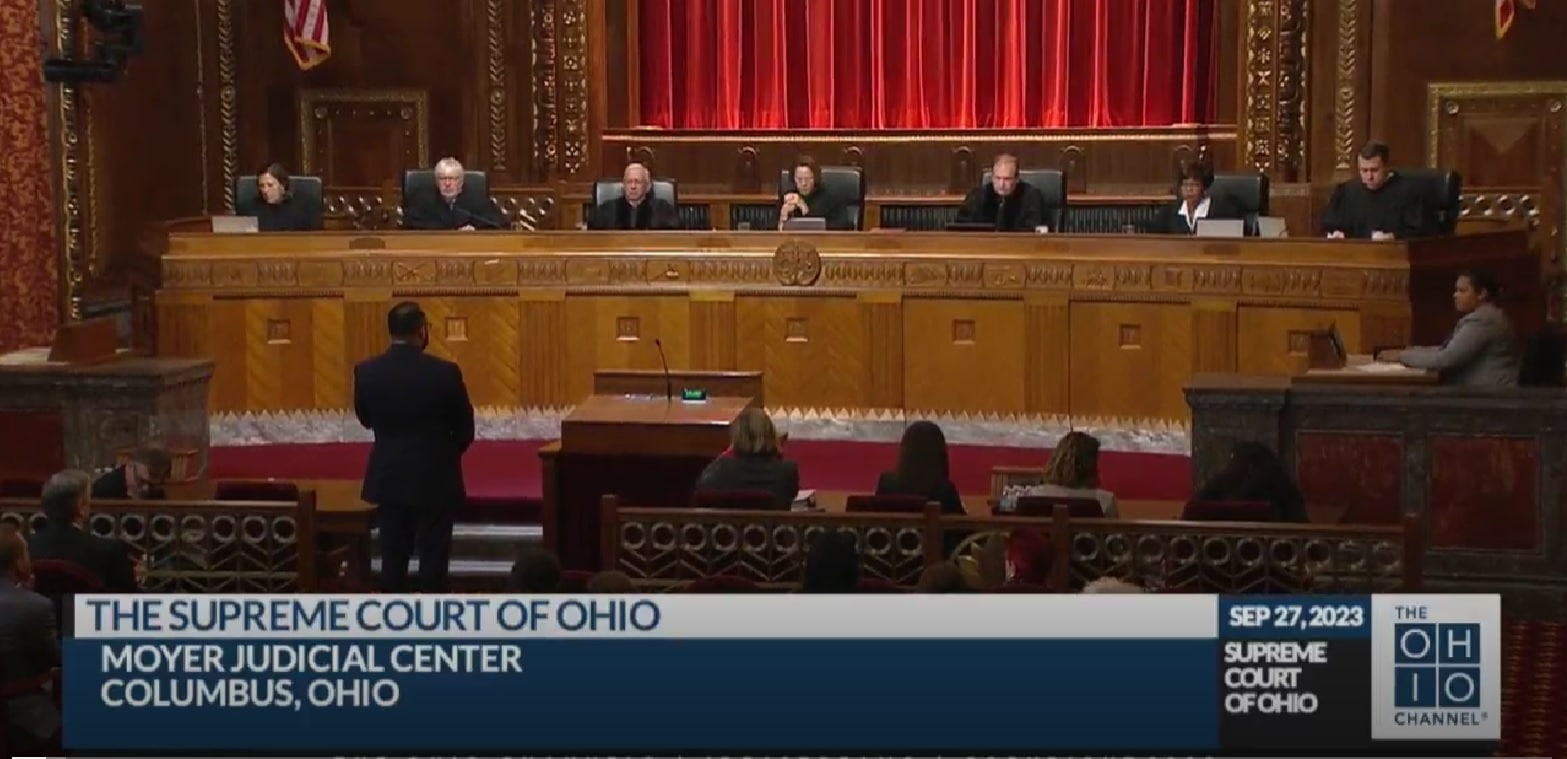COLUMBUS, Ohio — The Ohio Supreme Court must decide whether a preliminary injunction constitutes a "final judgment" that allows for appeal — and a challenge to the state's "heartbeat" abortion bill is the court's litmus test.
Ohio Solicitor General Benjamin Flowers argued Wednesday before the state's high court that refusing to let the government appeal injunctions would drastically tip the scales of judicial power.
"If the First District's decision is right," he told the justices, "then trial court judges are among the most powerful officials in all of state government."
Flowers' comment referenced a panel of Ohio appeals court judges' ruling that the state could not appeal a preliminary injunction granted by a Hamilton County Common Pleas Court judge in October 2022.
That decision halted enforcement of Ohio Senate Bill 23, which requires health care providers to determine whether a fetus has cardiac activity and prohibits abortion if a heartbeat is detected.
Passed in 2019, the law was first blocked from taking effect by a federal judge, but later reinstated after the U.S. Supreme Court overturned Roe v. Wade in its landmark decision in Dobbs v. Jackson Women's Health Organization.
Ohio Supreme Court Justices Patrick Fischer and Michael Donnelly asked Flowers on Wednesday whether a writ of procedendo would have been the proper course of action to challenge the rulings of both the common pleas and appeals courts.
"There would be no valid basis for a writ of procedendo if a court is scheduling hearings and discovery that it is required to hold by law," Flowers said. "We would have to show inordinate delay to get that. The problem, and the reason why we can immediately appeal here, is that the state has sustained irreparable harm."
Flowers compared the harms sustained by the state each day the law is enjoined to those inflicted on a company in a hypothetical trade secret case.
"There's no way to un-ring that bell later," he said. "Once that information is out, it can't be clawed back. When you deal with an irreversible medical procedure, you're in the same boat."
Justice Jennifer Brunner asked whether the plaintiffs in the case and individuals seeking abortions could make similar arguments regarding irreparable harm.
"Yes, and that's why they would have had an immediate appeal if the injunction were denied, and we wouldn't have contested that," Flowers answered. "All we're asking for is the rules to apply to both sides; we're not seeking special treatment."
Attorney Jessie Hill, a law professor at Case Western Reserve University, argued on behalf of the abortion providers who filed suit to enjoin the law. She said her clients "ask this court simply to adhere to longstanding, well-established rules regarding appealability and standing."
Justice Melody Stewart asked Hill about her opposing counsel's arguments regarding irreparable harm, and the attorney first pointed out Ohio law creates only a "very narrow exception" to allow for immediate appeal of an injunction.
Hill said the state's argument about being unable to enforce the law would create "an enormous exception" applicable to any case involving enforcement of any law, not just the heartbeat bill.
She emphasized the Ohio legislature could have written an exception into its procedural rules, regarding the appealability of preliminary injunctions against state laws, but chose not to.
Each party also discussed whether Preterm Cleveland and other abortion providers established third-party standing on behalf of their patients. Hill claimed the time-sensitive nature of an abortion constitutes a "hindrance" for a patient that might seek to file suit on her own behalf.
"They have a matter of weeks in which to bring that lawsuit," she told the court. "There may be other financial issues, other health care concerns. They are not in a position to hire an attorney, bring a lawsuit, seek an injunction, and even if they were to bring it, they're not going to remain pregnant for very long."
"This is the paradigm case for third-party standing," she concluded.
Flowers cited a "lack of evidence" to establish third-party standing and said the abortion providers failed to prove members of the class of women it seeks to represent can't file their own individual lawsuits under pseudonyms.
"They can't prevail here by showing there is some hypothetical plaintiff out there who would be impaired," the state's attorney said. "They have to show that the entire category of people whose rights they're representing are hindered."
He cited the Supreme Court's ruling in Dobbs and said the nation's high court determined third-party standing had been "warped" in service of abortion rights.
Flowers also argued the providers lack the "close relationship" with patients to establish standing on their behalf.
Brunner pushed back against that line of thinking.
"Isn't the nature of a physician-patient relationship a close relationship?" she asked. "It's a caring relationship, they have physical contact with one another. How does that not qualify?"
Wednesday's arguments highlighted the omnipresent nature of the issue of abortion in the Buckeye State and served as a prelude for the upcoming November election, in which Ohioans will decide whether to enshrine the right to an abortion in the state's constitution.
Justice Joe Deters recused himself from the case, as he was named as a defendant in the initial lawsuit.
Subscribe to Closing Arguments
Sign up for new weekly newsletter Closing Arguments to get the latest about ongoing trials, major litigation and hot cases and rulings in courthouses around the U.S. and the world.









